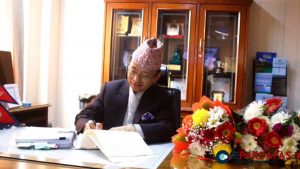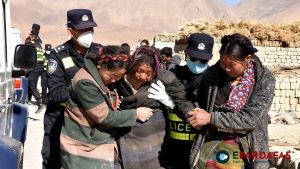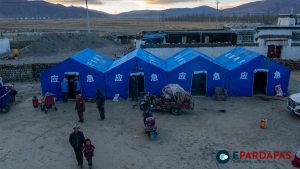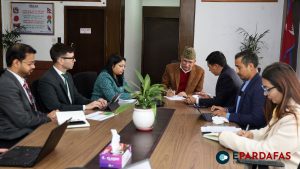
280 Chinese Arrested for Fraud and Trafficking in Laos’ Golden Triangle
Lao and Chinese police have arrested and deported 280 Chinese who allegedly worked in an online fraud operation at an illegal call center in the Golden Triangle Special Economic Zone in northern Laos, state media and people familiar with the situation said.
The murky Chinese-run special zone along the Mekong River in Bokeo province is a gambling and tourism hub catering to Chinese visitors as well as a haven for online fraud, human trafficking, prostitution and illegal drug activities.
Scamming operations run by Chinese nationals who try to trick people into fake investments are rife in the zone and usually employ Laotians and other Asians trafficked to the area to work in the call centers. Many of the workers are mistreated and prevented from leaving the premises.
During the arrests on June 20, authorities seized nearly 460 computers and 1,345 mobile phones from the suspects, according to a Lao Security News report.
An officer at the SEZ’s Security Department told Radio Free Asia that his department was not ready to comment on the arrests and deportations, which took place three days after the Chinese were apprehended.
A Laotian who works in the SEZ, who like other sources in this report requested anonymity for safety reasons, said authorities recently stepped up patrols there and likely had arrest warrants from Beijing to apprehend the Chinese because they allegedly scammed their own countrymen.
Legal experts told RFA that the Chinese were deported right away because Laos and China have an extradition treaty, and that they would be tried in China because they allegedly committed crimes against fellow nationals.
Root causes
But some Laotians said the latest round of arrests would not eradicate the root cause of the problem.
“Wiping out all these scamming activities is almost impossible because some Lao officials must be behind the schemes,” said a Bokeo province resident, referring to rampant corruption among Lao authorities.
“So many Chinese live in the SEZ and many of them are bad elements,” he added. “It’s very hard to get rid of all the bad guys.”
Hundreds of other Chinese nationals have been arrested since September 2023 for suspected involvement in scamming operations in the SEZ.
In January, Laos repatriated 268 Chinese citizens suspected of scamming while living or working at the SEZ.
In November 2023, Lao authorities arrested more than 430 Chinese nationals who appeared to be involved in fraudulent call center operations in the SEZ, and handed them over to their Chinese counterparts for deportation.
And that September, the Lao Ministry of Public Security deported 164 Chinese arrested in Vientiane and other Lao provinces, including Bokeo. Nearly 50 of them were arrested in the Golden Triangle SEZ and believed to be involved in running call centers.
Facebooker intimidated
A Lao Facebook user who posted an online comment criticizing the government’s failure to rescue victims of human trafficking from the SEZ’s Chinese-run call centers told RFA on Wednesday that police showed up at his house and demanded he remove the post, saying it defamed the government.
“They wanted to cover up that story or they didn’t want me to say anything about that,” he said. “For me, I just wanted to tell the truth.”
The man said he knows many other Facebook users whom police have warned or arrested and detained for three to six months for posting comments on social media about the country’s worsening economic and financial conditions.
“Some of them were so scared that they fled to other countries,” he said.
An employee at a state-run media outlet told RFA the same day that Laotians are afraid of posting criticism of the government online because authorities will come after them, order them to remove the content, and may seek to punish them.
“They’ll look for you, and you won’t be safe,” he said. “That’s why our Lao people are afraid to speak out.”
“Our laws might state that people are free to express themselves but in practice, they can’t,” he added.
Article 44 of the country’s constitution guarantees citizens freedoms of expression, assembly, association and protest.
But Article 117 of the Penal Code states that those who conduct propaganda activities against and slander the state or distort the policies of the one-party state and government can be jailed for up to five years and be fined 5 million-20 million kip, or US$225-900.
Individuals who have their own social media accounts must register with the government and are obligated to report the truth and not to criticize the party or government, said another employee at a state-run media agency in southern Laos.
In 2019, the Lao Ministry of Information, Culture and Tourism mandated that all individuals and legal entities that post news stories on social media had to register with it or face legal consequences.
Two years later, the Lao government set up a committee to monitor content and news posted on social media.
- Kaski Court Grants Bail to Rabi Lamichhane in Embezzlement Case
- Upper Mustang Sees Over 4,000 Foreign Tourists in 2024, Marking a 14% Rise
- Hollywood Wildfires Ravage Los Angeles, Claiming Lives and Thousands of Homes
- Nepal Deports 147 Chinese Nationals in 2024 Amid Rising Concerns Over Crimes and Overstays













Comments